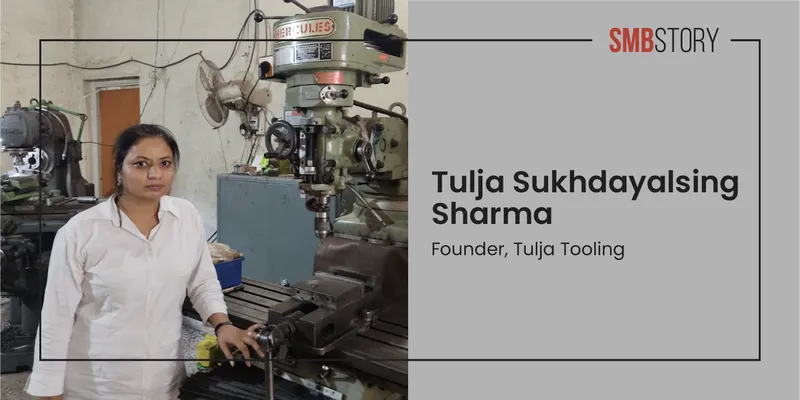These entrepreneurs prove that struggle is a part of success: top SMB stories of the week
This week, SMBStory brings to you the story of founders who, through resilience, have overcome adversities and build promising businesses.
It is said that strong people don’t fear struggle as struggle is a part of success. This week, SMBStory came across entrepreneurs who have not only overcome their adversities but have built promising businesses amid the challenges they had to face in their journey.
Here are the top SMB stories of the week.
Tulja Tooling

Last week, while the business community and media were celebrating, and rightly so, the rise of women entrepreneurship in India on the occasion of Women Entrepreneurship Day, a 34-year-old frail woman stood resolutely under her dripping umbrella awaiting a bus.
A business owner herself, she was on her way to meet a potential customer. Tulja Sukhdayalsing Sharma aka Rani Tulja has a small workshop in Aurangabad under the name of Tulja Tooling in the machine tools business. For nearly two years now, she has been out on the road, come rain or shine, meeting industrialists and manufacturers to sell her products.
Being one of the few women who chose to set up her own tooling workshop rather than work in another establishment, soft-spoken Rani Tulja stands out in this macho landscape of machines and tools.
After completing her diploma in Draftman Mechanical from the town, Rani not only battled the prejudice that her gender attracts, but had to undergo severe personal challenges to the point where she even contemplated ending her life.
Yet, today, she stands tall.
She has not only found a firm footing in her area of expertise but has expanded the market of her products to neighbouring Kolhapur, Nagpur, and other states like Gujarat and Punjab. Today, she has five machines, including a milling machine, lathe machine, and drill machine, and employs two workers. She does the design, technical work, and marketing herself, and made a modest sum of Rs 24 lakh last year.
KDM India

Nilesh Mali started his first job at the age of 18 when he moved to Mumbai from Jalore, a district in Rajasthan famous for the Marwari horse breed. With dreams of achieving something big in his life, Nilesh took up odd jobs in retail shops in the early 2000s. He then moved to other electronic goods such as selling walkmans and radio.
Almost two decades later, Nilesh is running a company with an annual turnover of Rs 30 crore. According to the founder, , founded in 2011, gives a lifestyle choice to people living in Tier II and III cities.
KDM India manufactures affordable mobile chargers, earphones, speakers, neck bands, among others.
In an interaction with SMBStory, Nilesh says,
“I come from a very small town but when I came to Mumbai to find work, I had very big dreams. I struggled for days and took up a lot of small jobs to earn money. I still remember the day when my friend suggested trading mobile accessories as they were hot selling then and that changed my life.”
KDM India now makes 200 SKUs (stock-keeping units) and has a distribution network pan India.
Other top stories of the week
Cello Group

“2020 was a tough year for everyone,” says Gaurav Rathod, a fourth-generation entrepreneur and Director, Cello Group. However, Gaurav feels that despite being a heavily offline-operating company, Cello managed to survive the crisis and hopes to bounce back to “pre-pandemic levels”.
Started in 1967 by Ghisulal Rathod, is not a new name in the Indian market.
Gaurav says his great-great-grandfather started the company by making plastic bangles and polyvinyl chloride footwear in Mumbai. Today, it is known for manufacturing and selling a diverse range of products from glassware to kitchen appliances.
Experts have often said that the company’s “elasticity” has helped it survive and stay strong as a company amid competition from players like Borosil, Tupperware, Milton, Treo, Nilkamal, and many more.
Cello has had quite a journey.
From seven machines and 60 workers, the company today employs about 6,000 people and has factories in Haridwar, Kolkata, Chennai, Daman, Pardi, and Baddi.
RR Kabel

, one of the leading wires and cables brands in India today, faced many challenges in the initial days.
It was started in the early 90s by Rameshwarlal Kabra as a small trading business of wires and cables in Delhi. But there was a major fire outbreak in the office in their early days. Fortunately, the accident didn’t cause much damage, but Rameshwarlal was forced to think of the safety feature in the wirings.
“My father realised safety should be a top priority in the wires and cables industry and that we should bring safer wires into the market,” Shreegopal Kabra, a second-generation entrepreneur and Managing Director and Group President, RR Global, and the son of Rameshwarlal Kabra, says in an interaction with SMBStory.
Rameshwarlal took the lesson from that horrific incident and turned that into an inspiration to manufacture wires and cables in-house. Thus began the journey of RR Kabel, which is now known as RR Global. It is an $850+ million conglomerate in the electrical sector having a presence in over 85 countries globally.
Edited by Saheli Sen Gupta









